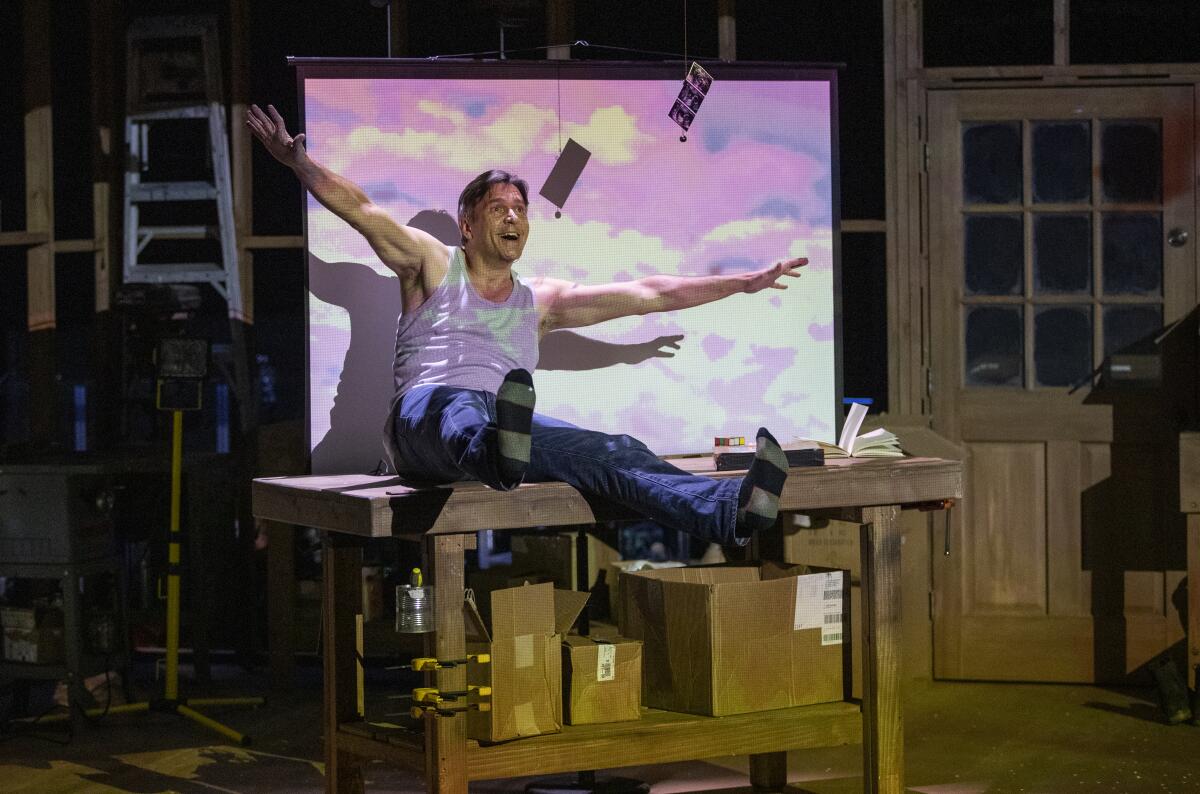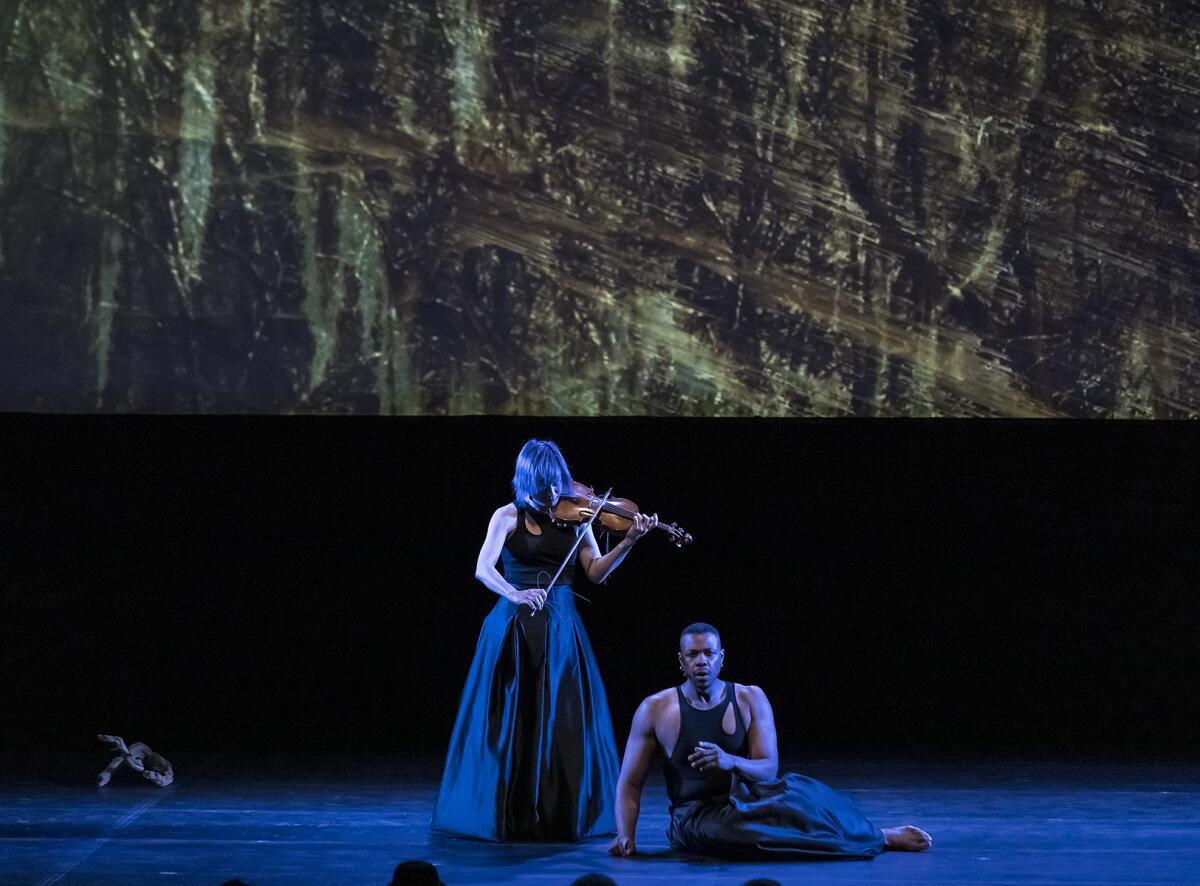Review: A pair of baritones and a violinist take agency in two new SoCal operas

- Share via
Two new one-act music theater monodramas were given their individual world premieres in Santa Barbara and Los Angeles Tuesday and Wednesday, respectively. While unrelated, each was an inspiration of, and an act of agency by, a well known baritone. Gender is on the table, as is race and personal transformation. Each has been individually in development for the last five or six years. Each is structured as kind of dramatic song cycle.
The timing of the premieres, which included delays because of the pandemic, was entirely coincidental if you believe in coincidence. I don’t. They are all but tailor-made to be mounted together as a single evening.
“Everything Rises,” which was commissioned by the UC Santa Barbara Arts & Lectures series, is a personal project by Davóne Tines and violinist Jennifer Koh, with an all-BIPOC team, that experimentally explores with ancestry and inclusivity. A somewhat more conventionally operatic “In Our Daughter’s Eyes” by Du Yun was created for Nathan Gunn. Its premiere at REDCAT Wednesday was by Los Angeles Opera for its Off Grand series and has performances through Sunday.
The seemingly unfashionable issue of “In Our Daughter’s Eyes” is masculinity. When asked about manhood in the 21st century, Du Yun said in a talkback after the performance, “I don’t know much about that, and I don’t really care about that.” The composer then added that she loves her father, whom she credits with having been a strong role model.
With a libretto by Michael Joseph McQuilken, who also directed the production, the opera is the letter/diary of a father chronicling the birth of his daughter. A beguiling character who likes airplanes, partying, drinking and puttering around his man cave workshop, he is forced to confront his shallowness when his wife’s pregnancy begins to go badly. Catharsis leads, with a theatrical turn of events, to epiphany.
Without a spoiler, I dare say no more other than “In Our Daughter’s Eyes” is based on real life and is meant to bring unexpected tears to our eyes. It also brings the Kafka-esque Du Yun into atypically melodramatic territory. Her opera “Angel’s Bone,” which won a Pulitzer Prize, is a musical wild ride that revolves around the sexual exploitation of angels who return to Earth and become enslaved. “A Cockroach’s Tarantella,” for speaker and string quartet, concerns a cockroach’s desire to become human rather than be crunched by humans. She contributed enticing offbeat elements to the Industry’s “Sweet Land.”
But she is not without her still edgy approach, with a blaring, bedazzling score for violin, cello, clarinet/saxophone, trumpet, guitar and percussion. Vibrantly conducted by Kamna Gupta, it makes little allowance for sentimentality.
Gunn is terrific. The opera was his own effort to become a more creative performer and, as a father of five and a recovering alcoholic, has elements of his own personality and story. He jumps into each scene, busy as a bee. With the help of projections, his workshop readily becomes the site of surreal dreams, of visions of his past, of the baby’s progress and her uncertain future. He builds a playpen while also constructing his own maturity. The vocal lines are robust; the singing, exceptionally so.
Unfortunately, though, the unsubtle amplification of Gunn’s baritone exaggerates nuance to the point of no longer being nuance. “I will be an honest reporter,” he sings at the beginning of the opera in a voice disembodied by loudspeakers. Over time, the ear adjusts (as the ear does in overly loud movie theaters) and your brain begins to put artificial sound and real person together, but only through mental desensitizing. Cut the amplification in half and the opera will double in honesty.
Like “In Our Daughter’s Eyes,” the production of “Everything Rises” by Alexander Gedeon (who recently resigned from Long Beach Opera, citing the organization’s “culture of misogyny” and “racial tokenism”) uses projection, but it is more spare, more choreographed, more restrained. Koh and Tines take us through their parallel journeys from traditional careerism to becoming themselves. It is a slow process of illumination — sometimes angry, not always comprehensible but ever indispensable.
The production begins with a video clip that can be found on YouTube of Koh at 17 in a phenomenal performance at the 1994 Tchaikovsky Competition, of which she was a top prize-winner.
When Koh walks on stage for real, she is in a soloist’s formal silk gown and plays holding a single tone with an authority full of inner meaning. Tines emerges in the traditional formal attire that he wore at the beginning of his career as well and describes himself in song as “a moth lured by moneyed benefactors, a wind-up monkey to sing for their private dinners.” By the end they are both wearing skirts and in each other’s arms, free to be themselves.

Ken Ueno’s score is subtly chant-like, serving less to announce itself as to empower the performers on their effortful path to self-expression. When the music does stand out — as in an intrusive rhythm track on Ueno’s otherwise gripping arrangement of the Billie Holiday’s covert ode to racial justice, “Strange Fruit” — it diminishes.
Interviews by Koh and Tines with relatives make vivid their backgrounds. The dramaturg Kee-Yoon Nahm said their relatives are characters in the drama. Koh’s mother is seen in large projections and heard explaining how she chose to emigrate from Korea to the United States when she was 22 but that her daughter had no choice about growing up an Asian in a non-Asian world. Tines learns of a relative’s lynching, and there are projections of broken branches.
Koh and Tines explain in the program note their need to listen for “resonances across Black and Asian histories” as they uplift their voices “poised to speak truths.”
As an “audience shrouded in a cloud of whiteness,” we are asked to meet their gaze and listen to their stories. Campbell Hall on the UCSB campus was not full and the audience was, as the artists anticipated, primarily white. Koh and Tines’ stories compel and help explain their sensibilities as outsiders. But the fact is, great artists are by definition outsiders whose purpose is to show us what we don’t otherwise see.
What we first notice in Koh and Tines is their extraordinary communicability. Violin and voice speak with an eloquence and power worth knowing about. But that, as in all artists, is background. Everything might rise even higher with those resonant histories in the background rather than foreground. Koh and Tines’ stories have made them what they are, but their art needs to be — and is — great enough to tell us who they are.
That too brings in the issue of amplification, which captured every breath Tines took and distorted his louder passages. For Koh, the slightest sound of the bow touching strings could be magnified into a major event. Each, however, is a performer whose very presence draws you in. You make the effort. The amplification on this scale does the work for you. Change comes with effort.
In the end, though, the most important change is the maturation of Koh, Tines and Gunn beyond the comfort of conformist concert stages and into places where real issues can be expressed. This is how they have earned our trust, and why overamplification is not about trust.
After a second performance Thursday night, presented by the Center for the Art of Performance, UCLA at Royce Hall, “Everything Rises” will likely go to New York, but nothing has been announced. “In Our Daughter’s Eyes,” produced by Beth Morrison Projects, will go to the Prototype Festival in New York in January 2023, as Morrison announced from the stage. After that comes the opportunity for a savvy presenter to book the operas together.
'In Our Daughter's Eyes"
Where: REDCAT, 631 W. 2nd St., Los Angeles
When: 8 p.m. Saturday, 5 p.m. Sunday
Tickets: $74
Info: laopera.org, (213) 972-8001
More to Read
The biggest entertainment stories
Get our big stories about Hollywood, film, television, music, arts, culture and more right in your inbox as soon as they publish.
You may occasionally receive promotional content from the Los Angeles Times.











